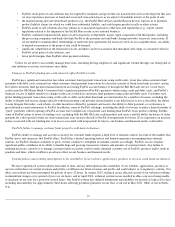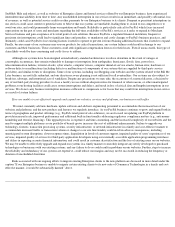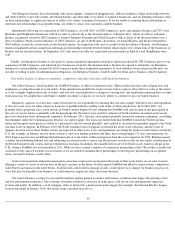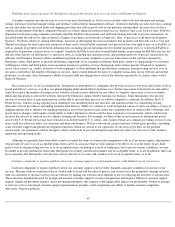eBay 2013 Annual Report Download - page 45
Download and view the complete annual report
Please find page 45 of the 2013 eBay annual report below. You can navigate through the pages in the report by either clicking on the pages listed below, or by using the keyword search tool below to find specific information within the annual report.
Our Enterprise business has relationships with search engines, comparison shopping sites, affiliate marketers, online advertising networks
and other websites to provide content, advertising banners and other links to its clients' ecommerce businesses, and our Enterprise business relies
on these relationships as significant sources of traffic to its clients' ecommerce businesses. If we are unable to maintain these relationships or
enter into new relationships on acceptable terms, our ability to attract new customers could be harmed.
Immediately following our acquisition of GSI Commerce, we sold 100% of GSI Commerce's sports merchandise business and 70% of its
RueLaLa and ShopRunner businesses (which we refer to collectively as the divested entities), to Kynetic LLC, which we refer to as Kynetic.
Kynetic is primarily owned by GSI Commerce's former Chairman, President and Chief Executive Officer. Each of the divested entities was a
direct or indirect wholly-owned subsidiary of GSI Commerce. As part of the Kynetic divestiture, we loaned Kynetic and the divested entities
$467 million, secured by certain assets of the divested entities. In connection with (and as a result of) the divestiture to Kynetic, our Enterprise
business maintained certain commercial and financial relationships with the divested entities which expose it to certain risks of the businesses of
Kynetic and the divested entities. In September 2013, this note receivable was repaid and our investments in RueLaLa and ShopRunner were
sold.
Finally, our Enterprise business is also party to certain acquisition agreements relating to entities purchased by GSI Commerce prior to our
acquisition of GSI Commerce, and which relate to businesses owned by the divested entities. Kynetic has agreed to indemnify our Enterprise
business for certain liabilities incurred by GSI Commerce under these acquisition agreements. If such liabilities were realized and Kynetic was
not able or willing to meet its indemnification obligations, our Enterprise business would be liable for them and its business could be harmed.
Our tickets business is subject to regulatory, competitive, and other risks that could harm this business.
Our tickets business, which includes our StubHub business, is subject to numerous risks. Many jurisdictions have anti-scalping laws and
regulations covering the resale of event tickets. Some jurisdictions prohibit the resale of event tickets at prices above the face value of the tickets
or at all, or highly regulate the resale of tickets, and new laws and regulations or changes to existing laws and regulations imposing these or other
restrictions may be adopted that could limit or inhibit our ability to operate, or our users' ability to continue to use, our tickets business.
Regulatory agencies or courts may claim or hold that we are responsible for ensuring that our users comply with these laws and regulations
or that we or our users are either subject to licensure or prohibited from reselling event tickets in their jurisdictions. In October 2007, two
plaintiffs filed a purported class action lawsuit in North Carolina Superior Court alleging that StubHub sold (and facilitated and participated in
the sale) of concert tickets to plaintiffs with the knowledge that the tickets were resold in violation of North Carolina's maximum ticket resale
price law (which has been subsequently amended). In February 2011, the trial court granted plaintiffs' motion for summary judgment, concluding
that immunity under the Communications Decency Act did not apply. The trial court further held that StubHub violated the North Carolina
unfair and deceptive trade practices statute as it pertained to the two named plaintiffs, and certified its decision for immediate appeal to the North
Carolina Court of Appeals. In February 2012, the North Carolina Court of Appeals overturned the lower court's decision, and the Court of
Appeals' decision is now final. Similar actions are expected in other states. Laws and regulations governing the resale of event tickets outside the
U.S. (for example, in Europe) may be more restrictive, and carry harsher penalties and fines, than corresponding U.S. laws and regulations. In
2012, France passed a law prohibiting the habitual resale of event tickets without permission from the event organizer. In 2013, Belgium passed
a similar law prohibiting habitual sale and subjecting occasional resale to a price cap. Restrictions on ticket resale are also under consideration by
the Dutch Parliament and various state governments in Australia. In addition, the unauthorized resale of football (soccer) tickets is illegal in the
U.K., where a StubHub site was launched in 2011. While we have secured a number of commercial partnerships in the UK in order to enable our
customers to buy and sell football (soccer) tickets, if we are unable to maintain these partnerships or develop new partnerships on acceptable
terms, our tickets business would suffer.
Some event organizers and professional sports teams have expressed concern about the resale of their event tickets on our sites. Lawuits
alleging a variety of causes of actions have in the past, and may in the future, be filed against StubHub and eBay by venue owners, competitors,
ticket buyers and unsuccessful ticket buyers. Such lawsuits could result in damage awards, could require us to change our business practices in
ways that may be harmful to our business, or could otherwise negatively affect our tickets business.
Our tickets business is subject to seasonal fluctuations and the general economic and business conditions that impact the sporting events
and live entertainment industries. The economic downturn resulted in a decrease in ticket prices sold on our sites and negatively impacted
revenue and profits. In addition, a work stoppage, strike or lockout by a professional sports league (for example, the National Hockey League
lockout that ended in January 2013) that results in the cancellation of all or a
43
























